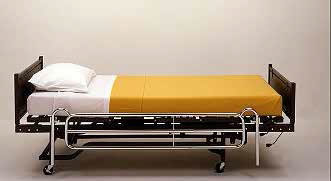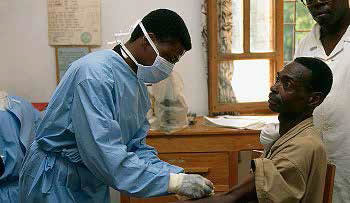National Health tackles non-availability of medicine
National Health tackles non-availability of medicine Estelle GreeffThe National Department of Health has appointed a task team to review the various reports on medicine availability and advise the Department on the interventions that should be implemented to address the challenges.
 The task team is made up of both local and international experts in the field of medicines and medicine supplies. They include members from the World Health Organisation (WHO), Health Action International (HAI), Management Sciences for Health (MSH) and supply chain management services and have extensive experience working in several countries supporting medicine supply systems.
The task team is made up of both local and international experts in the field of medicines and medicine supplies. They include members from the World Health Organisation (WHO), Health Action International (HAI), Management Sciences for Health (MSH) and supply chain management services and have extensive experience working in several countries supporting medicine supply systems.
 The task team reviewed reports from the Public Service Commission, the Ministerial Task Team on Pharmaceuticals and the Stop Stockouts Reports and recognised that the reasons for medicine unavailability at facilities are varied. Some of the key contributors include:
The task team reviewed reports from the Public Service Commission, the Ministerial Task Team on Pharmaceuticals and the Stop Stockouts Reports and recognised that the reasons for medicine unavailability at facilities are varied. Some of the key contributors include:
- Essential medicines that are no longer of any commercial value and no longer produced by manufacturers or their production is not prioritised (abandoned essential medicines)
- Difficulties with the manufacture of a medicine in line with orders received
- Delays in intercontinental transport systems
- Orders not received in time or insufficient quantities ordered
- Supply accounts not paid within 30 days
- Quantities ordered in excess of estimated contracted quantities
- Depots do not supply medicines as per quantity ordered from facilities
- Not ordering adequate quantities of medicines for the needs of patients seeking care at a facility
 The task team has proposed that interventions are structured to address each of the above areas. The problem of abandoned essential medicines is an international challenge, which the team has proposed must be addressed by the WHO. A global meeting has been scheduled for December 2015 to discuss a global response to abandoned essential medicines.
The task team has proposed that interventions are structured to address each of the above areas. The problem of abandoned essential medicines is an international challenge, which the team has proposed must be addressed by the WHO. A global meeting has been scheduled for December 2015 to discuss a global response to abandoned essential medicines.
A broader stakeholder meeting was convened to discuss the proposed interventions by the task team. Stakeholders included provincial health departments, non-governmental organisations, civil society organisations, pharmaceutical manufacturer associations, pharmacy associations and medical scheme administrators. The National Department of Health embarked on a number of interventions to address medicine non-availability at facilities. The task team endorsed these interventions and proposed additional measures.
 The stakeholder meeting reviewed the proposed interventions by the task team and adopted the following: The use of an online monitoring tool that the National Department developed in partnership with Clinton Health Access Initiative, which will serve as an early warning system at supplier level. Our information suggests that this system is unique – no other country has a similar system that monitors medicine supply at manufacturer level. The tool also monitors the time taken for suppliers to be paid.
The stakeholder meeting reviewed the proposed interventions by the task team and adopted the following: The use of an online monitoring tool that the National Department developed in partnership with Clinton Health Access Initiative, which will serve as an early warning system at supplier level. Our information suggests that this system is unique – no other country has a similar system that monitors medicine supply at manufacturer level. The tool also monitors the time taken for suppliers to be paid.
Monitoring medicine availability at facility level will be addressed through the deployment of stock visibility technology using mobile technology for clinics and a computerised system for hospitals. This system would allow for full visibility of stock through to facility level. The proposed mobile technology system is being deployed across the country with two provinces already completed. The system sends automated alerts to facility managers, district pharmacists, depot managers, heads of pharmaceutical services and heads of department alerting them of low stock levels.
 In order to address the erratic ordering and poor quantification, tender quantities will be ring fenced at provincial level. Orders will be placed in line with the estimates submitted at the commencement of the tender. A forecasting tool has also been developed to assist provinces with tender estimates. The tender specifications will be amended to require companies to bring in buffer stock to meet demand that is in excess of the usual orders.
In order to address the erratic ordering and poor quantification, tender quantities will be ring fenced at provincial level. Orders will be placed in line with the estimates submitted at the commencement of the tender. A forecasting tool has also been developed to assist provinces with tender estimates. The tender specifications will be amended to require companies to bring in buffer stock to meet demand that is in excess of the usual orders.
The team proposed that the role of provincial depots should be reviewed in line with the more efficient medicine distribution models used in the private health sector - the use of a cross-docking system with an increased number of medicines distributed through the direct delivery model. This model is used effectively in the private sector to deliver medicines within a few hours in most facilities.
 The importance of effective communication to address the non-availability of medicines is crucial. The meeting recognised that the non-availability of essential medicines is a global problem and communication should be directed to prescribers, dispensers and patients on duration of the shortage, alternative therapies and other relevant supply information.
The importance of effective communication to address the non-availability of medicines is crucial. The meeting recognised that the non-availability of essential medicines is a global problem and communication should be directed to prescribers, dispensers and patients on duration of the shortage, alternative therapies and other relevant supply information.